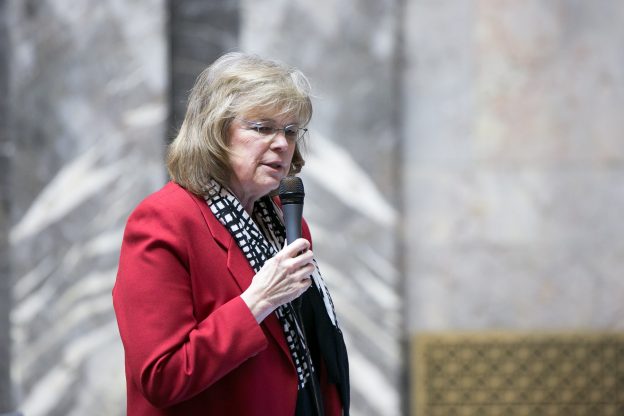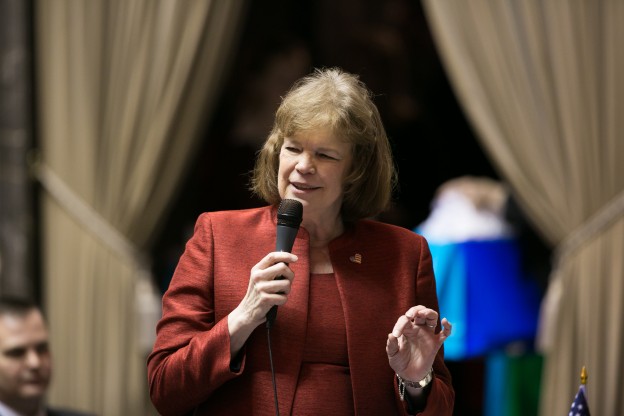
 March 9, 2017 |
||||
Greetings from Olympia!It is hard to believe that the 2017 legislation session is already over halfway complete. The Senate has been working late into the evening, passing legislation as we approach the March 8 deadline for voting on Senate bills. I have been fortunate to have a number of bills that I have sponsored approved by the Senate and sent to the House of Representatives for its consideration. One of the most consequential pieces of legislation that I have worked on is Senate Bill 5239, which is my collaborative attempt to address the recent Hirst decision that effectively put a halt to rural homebuilding around the state. My bill, which received some bipartisan support but not nearly as much as I was hoping, would put our state’s water law back in line with common sense and scientific consensus about the impacts of small, household wells. If my bill becomes law, local jurisdictions can again rely on the state Department of Ecology’s determinations on water availability, the way they have for years, so that property owners in rural parts of Washington can get the access to wells they need to obtain building permits. During the committee process we heard heart-wrenching stories from people around the state whose life savings were in jeopardy because they could not get a permit without potentially spending tens of thousands of dollars more on studies as a result of the Hirst court case. We need a solution to this problem and I am confident that my proposal will give families the relief they deserve from this overreaching decision. 

 Let’s TalkMy House seatmates and I will host a live telephone town hall beginning at 6 p.m. next Monday, March 13. The program is similar to a call-in radio show in that people may call and ask questions over the telephone and participate in surveys. To participate, residents may call (509) 941-2750 during the event and follow the prompts to join the conversation. For more information about the telephone town hall, contact me at judy.warnick@leg.wa.gov or (360) 786-7624.  It is an honor to serve as your state Senator. Please do not hesitate to reach out to my office with any questions or concerns you may have regarding your state government. Please watch your email, as I look forward to providing you with regular updates throughout the session.
Judy Warnick, 13th District Senator  Share my E-newsletterDo you know others who live in our district who may not be receiving my e-news updates? Please feel free to forward this e-mail invitation to them or click on the share button below. If you have received this without directly subscribing, please visit my website by clicking here and sign up to receive my e-newsletters!  Contact MeOlympia Office:103 Irv Newhouse Bldg. P.O. Box 40410 Olympia, WA 98504 Olympia Phone:360.786.7624 District Phone:509.766.6505 E-mail:Website: |
||||
 |
Author Archives: Laudan
Bill would expand protections for agricultural producers who host tourists
Today the state Senate approved Senate Bill 5808, sponsored by Sen. Judy Warnick, chair of the Senate agriculture committee, that would limit liability for ranchers and farmers engaged in agritourism activities. The legislation was approved 42 to 6 and goes to the House of Representatives for consideration.
“We want to promote our agriculture industry and agritourism as a great way for people to learn more about where their food comes from, and create better understanding of the life of our agricultural producers for those in urban communities,” said Warnick, R-Moses Lake. “Life on a farm is hard, sometimes dangerous work, and this bill clarifies liability when they open up their operations to the public to cut down their own Christmas trees, or pick their pumpkins for Halloween.”
Public testimony on the legislation indicated that in Kittitas County alone there are at least 15 such agritourism operations, providing millions of dollars to the local economy. Twenty other states have similar laws on the books aimed at clarifying and limiting liability for agritourism.\
“Insurance premiums for this industry have become very expensive, increasing by 400 percent in two years,” said Warnick. “We need this clarification to help family farms be more economically viable, engage with broader audiences, and have some protections when they are acting responsibly.”
On Tuesday evening the state Senate approved legislation from Sen. Judy Warnick that would help promote the state’s beef industry. Senate Bill 5793, also known as the “Beef Check Off,” would make changes to the per-head assessment for the Washington Beef Commission and generate more funding to expand markets. The measure was approved by a vote of 30 to 19 and goes to the House of Representatives for consideration.
“The main source of funding for the state Beef Commission is a per-head assessment on cattle. This bill increases that assessment for a good reason,” stated Warnick. “The commission provides valuable services for our cattlemen and this legislation will help promote our beef industry during what are challenging times.”
The bill would require that the commission report to the Legislature on how the funds are used to support this critical economic sector. According to the Beef Commission, the industry as a whole contributes over $5 billion to Washington’s economy.
“In recent years, the beef industry has had some hard times, and the commission’s work is critical to promote this cornerstone of the state’s economy,” added Warnick.
The state Senate’s Democrat minority today blocked a proposed constitutional amendment that would ban a tax on individual incomes.
All 25 members of the Senate majority supported the measure, joined by two members of the Senate’s Democrat minority. However, Senate Joint Resolution 8204 required a two-thirds majority to pass, or 33 votes of the 49-member Senate, meaning it fell short due to a lack of Democrat support.
Had the measure been approved, the state House of Representatives would also need to approve the measure by a two-thirds vote for it to go to voters in November. Sen. Judy Warnick, R-Moses Lake, issued the following statement after the vote.
“I am fighting to protect the will of the voters. Since the 1930s, Washingtonians have said repeatedly that the state should not have an income tax, and this resolution would have enshrined that in our state’s constitution. I believe it is a necessary measure to prevent special-interest groups from finding ways, as they have tried in Olympia and are now proposing in Seattle, from taking more taxpayer funds for pet projects.
“State spending has nearly doubled since the start of this century, yet the state’s population has only increased by 20 percent. That means that we are spending more and getting less. The push for more revenue is unwarranted and detrimental to our state’s economy as a whole and for families who would be hit hard by a tax on their income.
“The more money the taxpayers have in their pockets, the better. State government doesn’t need another revenue source that would allow endless spending, and reverse progress the Senate majority has made in prioritizing education and jobs – the real priorities of state government.”
Senate approves measure to increase number of tasting rooms
The state Senate today approved legislation sponsored by Sen. Judy Warnick that would expand the number of tasting rooms small wineries can operate from two to four. Senate Bill 5426 was approved overwhelmingly, 44 to 5, and goes to the House of Representatives for consideration.
“We have many small wineries that are in need of this kind of support,” said Warnick, R-Moses Lake. “This is a good small-business bill to help a growing industry thrive.”
The Liquor and Cannabis Board, which heavily regulates the industry, limits the number of tasting rooms a winery may operate separate from its manufacturing site, and must still approve any additional tasting rooms.
Warnick added, “It can be hard for small business to compete with large retailers; this legislation allows small wineries to get their products to consumers in an innovative and practical way.”
Sen. Judy Warnick, R-Moses Lake, and Reps. Matt Manweller, R-Ellensburg, and Tom Dent, R-Moses Lake, are holding an hour-long telephone town hall on Monday, March 13, at 6 p.m. The program is similar to a call-in radio show in which people may call and ask questions over the telephone and participate in surveys.
To participate, residents can call (509) 941-2750 during the event. If listeners have questions during the call, they can press the star (*) key on their telephone keypads.
For more information about the telephone town hall, residents can contact:
Sen. Warnick at (360) 786-7624 or judy.warnick@leg.wa.gov
Rep. Manweller at (360) 786-7808 or matt.manweller@leg.wa.gov
Rep. Dent at (360) 786-7932 or tom.dent@leg.wa.gov
The 13th Legislative District includes Kittitas and Lincoln counties, most of Grant and a part of Yakima County.
For more information about Sen. Warnick, visit:
www.judywarnick.src.wastateleg.org
For more information about Rep. Manweller, visit:
www.representativemattmanweller.com
For more information about Rep. Dent, visit:
www.representativetomdent.com
Sen. Judy Warnick’s legislation to promote agricultural conservation, Senate Bill 5010, was approved by the Senate Tuesday evening. The bill would protect irrigators’ water rights from relinquishment if the water allotment was not fully used due to conservation or efficiency efforts. The Senate approved the legislation 27 to 22 through a mainly party-line vote.
“The current system favors a ‘use-it-or-lose-it’ approach that could lead to wasting our valuable water resources,” said Warnick, who chairs the Senate Agriculture, Water, Trade and Economic Development Committee. “This legislation would reward agricultural water users for their conservation efforts without the risk of losing their unused water rights.”
There are other exemptions for water-rights relinquishment, but none aimed at conservation or efficiency.
“Our agricultural producers are good stewards of our state’s natural resources, and this would give them another tool to be a leader in those efforts,” added Warnick














